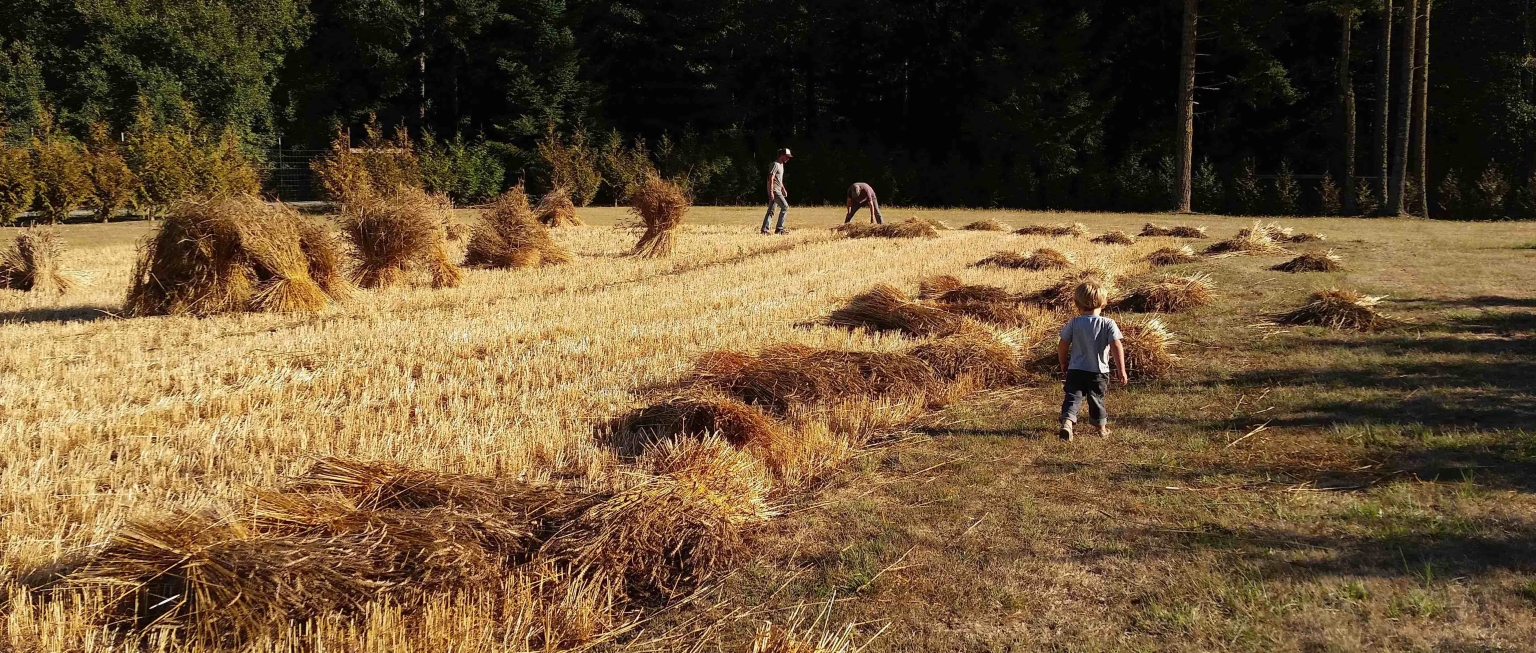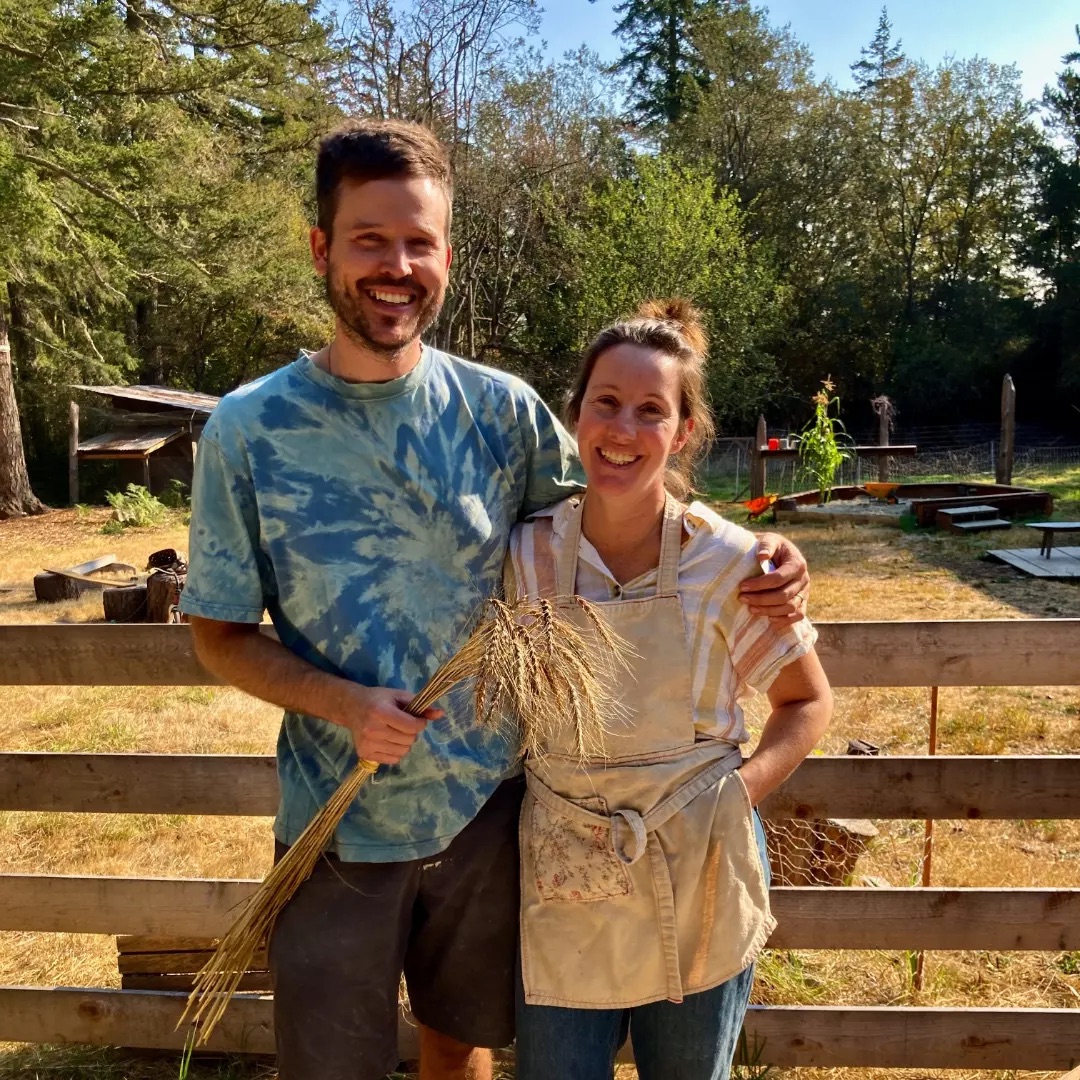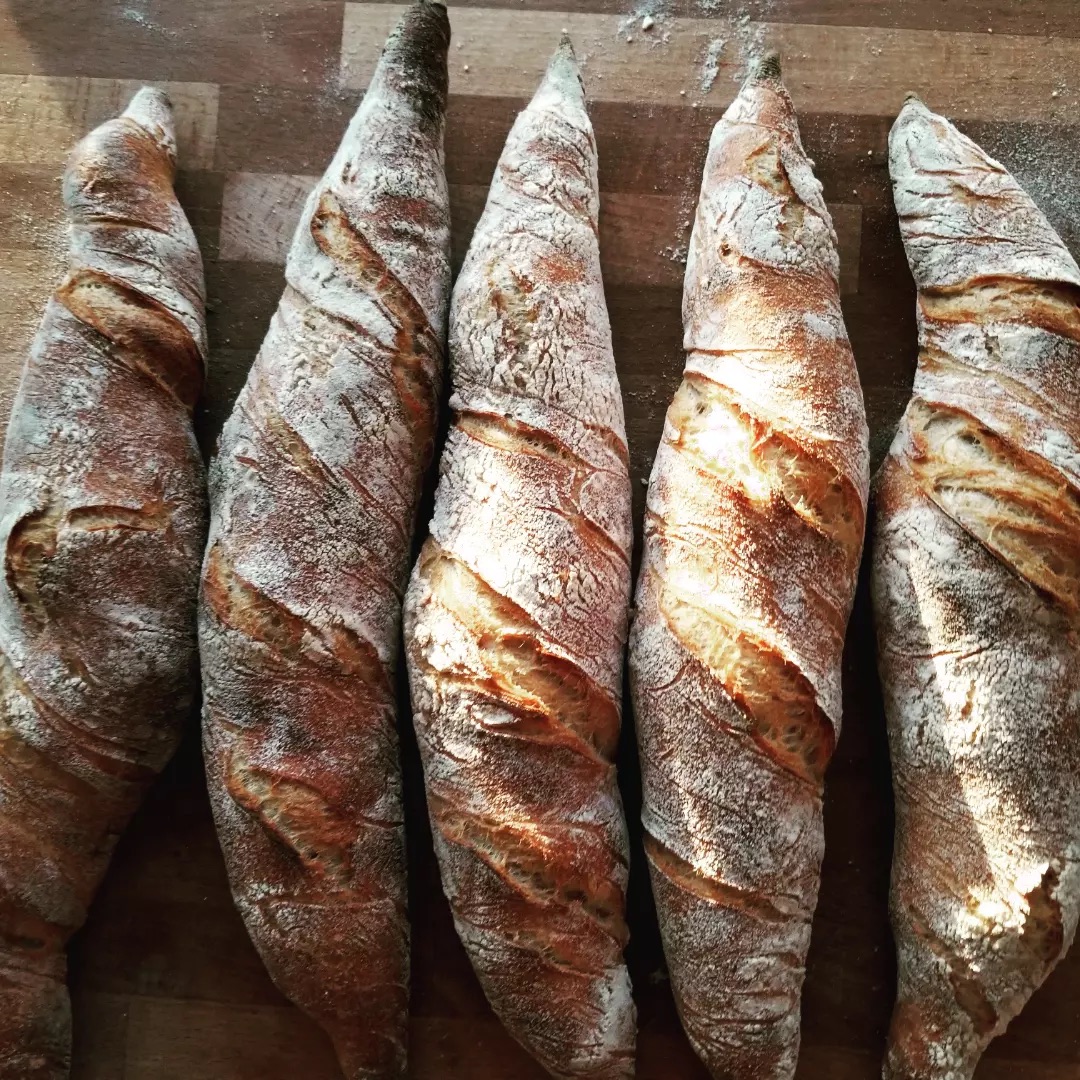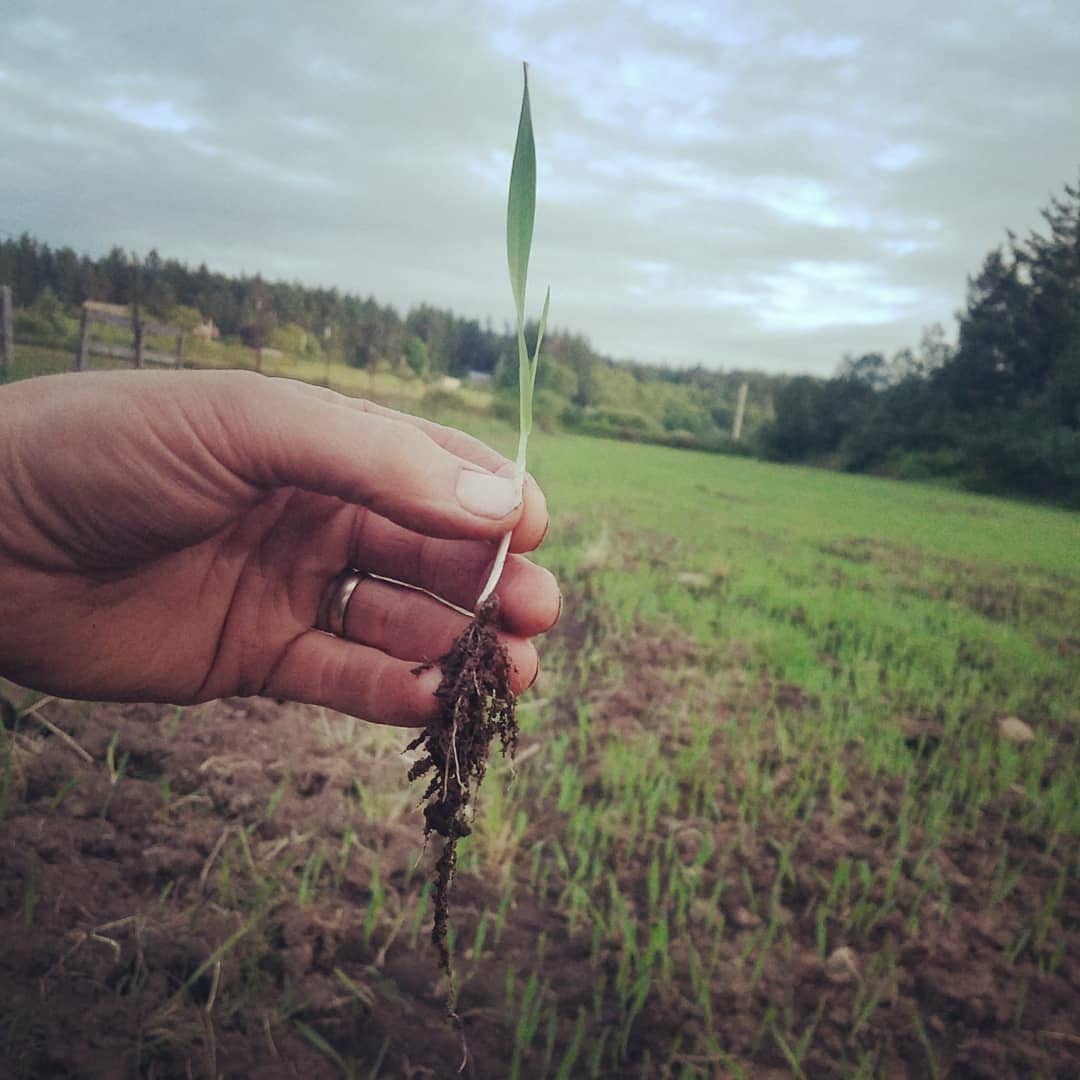Fundraising Complete!
On Saturday, May 25th 2024, LCLT completed fundraising for the land-only purchase at 108 Grayling.
We’re grateful for community support to make the purchase possible.
Land, Legacy, and Food Security on a Small Island: Barn Owl Bakery & Lopez Community Land Trust
In 2023, Sage Dilts and Nathan Hodges of Barn Owl Bakery approached LCLT to see if we could work together to make their farm and bakery more stable by thinking creatively about land ownership models and community partnerships. LCLT’s founding purposes, of supporting sustainable agriculture and cottage industries, and Sage and Nathan’s philosophy for their farm and business are a near perfect fit. The result is that LCLT has agreed to purchase the 17.5 acres of farm and forest land-only on which Barn Owl Bakery currently resides. In turn, Sage and Nathan will sign a 99-year lease with LCLT, eliminating their land debt burden. In this way, they maintain security, equity and legacy (the right to pass on the business and improvements to their heirs), and LCLT is able to hold the land in trust, ensuring that it is forever in service of the local food system. Sage and Nathan will continue to own the buildings and have full autonomy of how Barn Owl Bakery is operated.
This has proven to be an exciting venture. Sage and Nathan started Barn Owl Bakery on Lopez Island in 2013. In 2019 they took a big leap and purchased 17.5 acres of land, along with an old lumber barn turned hardware store turned art gallery. They brought new life to the building, turning it into their home and a space to expand their already successful bakery. Since then, Sage and Nathan have been busy transforming the buildings and land into a diverse agro-forestry system of managed forests, perennial crops, fruit trees, and an intensive annual garden where they will continue to grow and preserve in situ a diversity of rare and heritage grain varieties from around the world.
While the bakery business continues to thrive, operating a farm and bakery on a small island with high land costs requires creative solutions and additional support. The purchase price for the land was $389,650 which is the 2023 SJC assessed value of the land. LCLT has a $200,000 matching fund to start. By June 30, 2024, LCLT successfully raised the remaining $189,650 to complete the purchase of land-only.
Thank you for making history by ensuring a lasting legacy where farms are farmed and local food businesses are supported. For further info or questions, please contact lclt@rockisland.com or call 360.468.3723.
Thanks to our donors we’ve reached 100% of our goal!
Alex Nellie
Alex Thomson & Jasmine Park
Allan Stoner
Allison Williams
Amanda McCauley-Higgins & Thom Higgins
Anne Conte
Anonymous
Blake Rankin
Bob Wood
Bobbie Devore
Candace Jagel
Charles Hughes
Charlie Rush
Chris & Chom Greacen
Chris Park
Christa Campbell & Paul Henriksen
Christina & Jim Lockwood
Christine Kerlin & Tim Madison
Clarissa Szabados-Mish & Charles Mish
Claudia Elwell & Christine Langley
Cliff & Mary Ann Cameron
Cynthia Cantle
Cynthia Seely
Dale & Sue Roundy
Dana & Cindi Lund
Deborah Bundy & Richard Fagan
Deborah Dwyer
Doane Rising & Tad Cline
Douglas Smith & Stephanie Ellis-Smith
Edith Blomberg
Eleanor Brekke
Elizabeth Finkel
Elizabeth Munk Romney
Ellen Hale
Emma Rastatter & Wiley Webb
Faith Van De Putte & David Bill
Gale & Jay Lynch
Greg Amrofell, In Appreciation of Kerryn Reding, Lopez Champion
Hardie Cobbs
Holly & Tim Kent
Inez Black
Iris & Jerry Graville
Jaina Davis
James Lucal & Rebecca Romanelli
Jamie & Lauren Stephens
Jan & Richard Marshall
Jane & Richard Ward
Jane Fuller & Bill LeDrew
Jane Koger
Jane Marshall
Janet Cobb (Middle Marches CLT in UK)
Janet & James Coleman
Jeanna & Richard Carter
Jeff & Dianne Dyer
Jim Ghiglione & Sherry Brummel
Joanna Bloom
Joanna Plattner Mattson & Kirk Mattson
John & Carol Whetten
John Helding & Lisa Geddes
Judith Lackey
Karen Allen & Peter Stamats
Kat Randolph
Kathy Epidendio Jacobs & Kurt Jacobs
Kenny Ferrugiaro
Larissa Mansfield
Larry Eppenbach
Leslie Thornton & John Rumpeltes
Leslie Richter
Linda Hudson
Lois & Bob Wardell
Lorna Reese
Lynn Edmondson
Madeline Scarp
Marcy Montgomery
Margaret Schaaf & Stuart Dunwoody
Margo & Rodger Fagerholm
Marjorie Conway
Mark & Karen Eames
Martha Martin & Paul Porath
Mary Bywater-Cross
Mary Peterson & Agnes Govern
Megan McLean
Michael Hayworth & Annette Bader
Michele Heller (Heller Family Charitable Gift Fund)
Mike & Tayal Higgins
Mike & Wendy Mickle
Mindy & Bruce Richardson
Mysti McKeehan
Nancy Crowell
Nancy Ewert
Nancy Wallace
Nora McCloy & Terry Larson
Pam & Jim Phillips
Pamela McCabe
Pamela Pauly & Suzanne Berry
Pamela (Stewie) Stewart & Julie Golding
Pamela Weeks
Pat & Pete Kuentzel
Pat Fallon
Paul & Sherrie Brentson
Peggy Bill
Polly Ham
Priscilla Brekke
Randy Simon
Rebecca Munro
Rhea Miller & Sandy Bishop
Richard Kelly
Rick Strachan
Rita O’Boyle
Sally Dixon
Sand Dalton & Tara Garland-Dalton
Sanford Melzer & Ellen Evans
Scott & Ande Finley
Scott Rozenbaum
Sean Auclair & Emma Kahle
Sean Munson
Shelia & Ron Metcalf
Teri Linneman & Liz Scranton
Terrence & Manuela Crowley
Terri Drahn
Timothy Maxson
Toby Bright & Nancy Ward
Todd Goldsmith & Diane Dear
Tom & Lisa DiGiorgio
Tom Dixon & Larry deGroen
Trish Maharam
Wayne & Kiki Martin
Wendy McClure
William Dougal
If we inadvertently left your name off this list, please let us know at lclt25@rockisland.com
“By putting the land in trust, in the hands of the community, we not only create stability for ourselves but ensure that the land is used in service to the Lopez food system.”
– Sage and Nathan
Why This Project Matters
Values: LCLT has been engaged in supporting a sustainable and regenerative community, where land is held in trust in service of the community.
Working Rural Landscapes: People are attracted to the beautiful pastoral landscapes of Lopez Island. These landscapes exist in part because local residents cultivate working farms. What keeps people on the islands is the sense of community, much of which revolves around sharing local food.
Partners: LCLT is not directly engaged in farming but we can help preserve land that makes farming possible in perpetuity. This purchase of land-only is a collaborative effort between Barn Owl Bakery and Lopez Community Land Trust for the community’s benefit of supporting a healthy, regenerative local food system.
Legacy: Through this project 17.5 acres of farm and forest land is preserved in perpetuity as a lasting legacy.
Balance: It is possible to balance the needs of people, wild creatures, and the local economy. In this way, we further support a regenerative future for the Lopez community.
LCLT Frequently Asked Questions
What does it mean to hold land in trust for the local food system?
One of LCLT’s purposes is to remove land from the speculative market. LCLT is committed to holding the land forever and affordably leasing it back to community members for various uses including sustainable agriculture, forestry, affordable housing, cooperatives and cottage industries. LCLT will purchase the 17.5 acres of land only, holding it in trust and leasing it back to Sage and Nathan at an affordable rate. Sage and Nathan will retain ownership of the business and all the buildings on the land. This arrangement supports a viable local food system.
How does a leased land arrangement benefit the local food system?
Most small local food businesses operate on tight profit margins, separating the cost of the land from the cost of the buildings reduces the fixed costs and creates a more affordable model. Sage and Nathan will enter a 99-year one-time renewable ground lease with LCLT. LCLT is ensuring this land will be part of a local food security system for at least the next 198 years. By retaining ownership of the buildings and business, Sage and Nathan will build equity from their business and buildings and retain the right to pass these on to their children or sell to others who will carry on supporting the island food system.
Why partner with Barn Owl Bakery?
LCLT’s purposes, and Sage and Nathan’s vision for Barn Owl Bakery are in alignment. Both are committed to being good stewards of the land and seeking to ensure the land is in service of the local food system for generations to come. The building at Grayling has served the island in numerous ways over the years, as a lumber store (“the first Sunset Builders”), an art gallery and residence, and now a home, bakery, farm, and children’s place of learning. By holding the land in trust, we are helping to ensure that whoever lives on this land after Sage and Nathan will similarly add to our island’s local food security.
Diana Luhn Bower Spring Field Draining
Q&A with Sage & Nathan
What does the sale of land only mean for you and your family?
The issues we face as a farm and business are not unique to us. By going through this process and saying yes to a different approach to land ownership and land stewardship we hope to show how community ownership of land encourages and can be one essential element in a thriving local healthy food system. Talking with our farming and food peers we are all feeling squeezed between living our values of being good stewards of the land and the unforgiving realities of the market. By putting our land in trust with LCLT we take some pressure off our farm and bakery and open up more possibilities for community partnerships and feeding folks on this island with good healthy food.
Is Barn Owl Bakery still financially viable without the land debt?
Yes. The Bakery has been able to sustain us and this land and we’ve balanced our lives as bakers, farmers, parents and business owners. That said, we experience an inherent conflict between the costs of land ownership and livelihoods based on growing and making food that seeks to care for the land. The pressures that land ownership and debt put on our family farm and bakery makes it vulnerable in the long term to major unexpected costs. The business works well but covering a large mortgage for acres of land asks a lot of the month-to-month ups and downs of an island food business and when things go wrong – somebody gets sick, or a big piece of equipment breaks – there isn’t much of a cushion to keep the business going through a rough patch. We are not alone in this. Most farms and small family sustainable food businesses face the same issues. The high costs of land on Lopez and the interest on the loan we used to purchase and remodel Grayling in 2019 makes our fixed costs high. By reducing those fixed costs we are able to strengthen Barn Owl Bakery’s commitment to making and growing local food for the long term.
How did this partnership come about?
The initial loan we used to buy the land and buildings here at Grayling needs to be transferred from our original lender in early 2024. As we began thinking through what that might look like we realized we needed to talk with someone who understood the challenges of small farms and food businesses and land ownership. So we approached Sandy in 2023 to discuss the situation and found our conversation to be immensely helpful. We expressed our hope that we could find a path forward that not only transferred the loan, but also deepened our relationships with our community, building longer-term stability for our farm and bakery. From that conversation came the idea of LCLT purchasing the land-only and for us to lease the land through the 99-year ground lease.
Why partner with LCLT?
We didn’t know what answer we were expecting to find talking with Sandy, but as we continued the conversation with LCLT to put our land in trust, we realized that this was an opportunity not only to solve our immediate goal of loan refinancing, but also was a way for us to live into our values around alternative economies and models of land ownership. We are excited to serve as an example for other food businesses to think outside the box of traditional ownership models to ease the burdensome relationship of high property costs and tight profit margins. If we had transferred our loan to a traditional bank, we would have put our business and family’s financial future in the hands of an unstable financial system. By putting the land in trust, in the hands of the community, we not only create stability for ourselves but ensure that the land is used in service to the Lopez food system.





